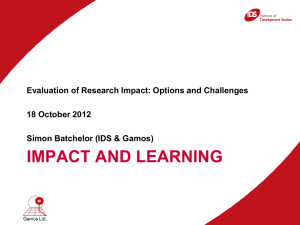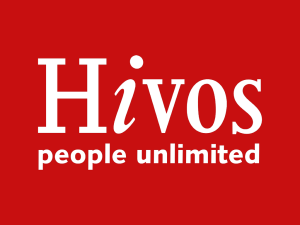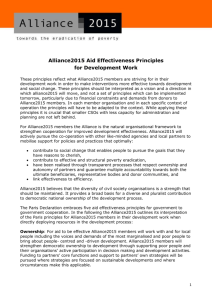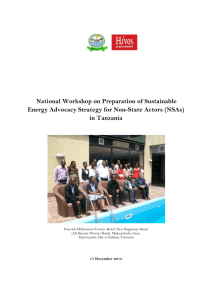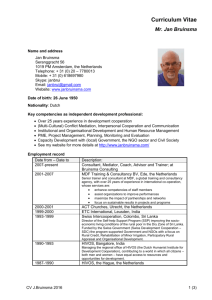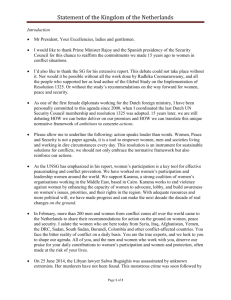KM4D_Journal_Vol5_Issue1_p75-84_Stremmelaar
advertisement
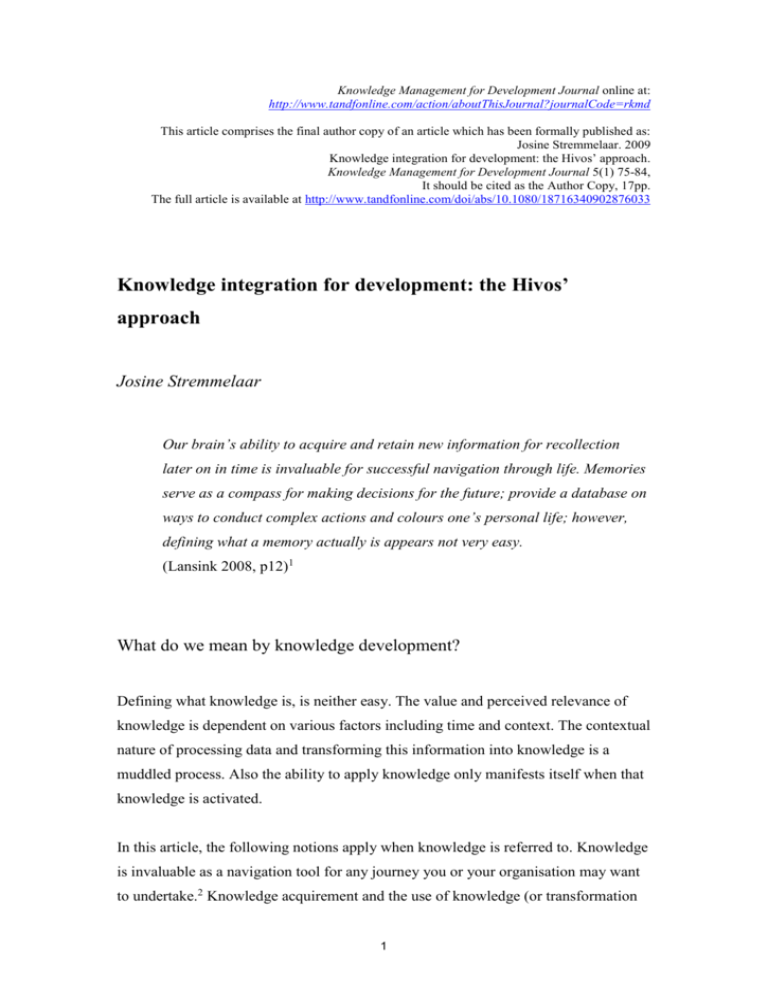
Knowledge Management for Development Journal online at: http://www.tandfonline.com/action/aboutThisJournal?journalCode=rkmd This article comprises the final author copy of an article which has been formally published as: Josine Stremmelaar. 2009 Knowledge integration for development: the Hivos’ approach. Knowledge Management for Development Journal 5(1) 75-84, It should be cited as the Author Copy, 17pp. The full article is available at http://www.tandfonline.com/doi/abs/10.1080/18716340902876033 Knowledge integration for development: the Hivos’ approach Josine Stremmelaar Our brain’s ability to acquire and retain new information for recollection later on in time is invaluable for successful navigation through life. Memories serve as a compass for making decisions for the future; provide a database on ways to conduct complex actions and colours one’s personal life; however, defining what a memory actually is appears not very easy. (Lansink 2008, p12)1 What do we mean by knowledge development? Defining what knowledge is, is neither easy. The value and perceived relevance of knowledge is dependent on various factors including time and context. The contextual nature of processing data and transforming this information into knowledge is a muddled process. Also the ability to apply knowledge only manifests itself when that knowledge is activated. In this article, the following notions apply when knowledge is referred to. Knowledge is invaluable as a navigation tool for any journey you or your organisation may want to undertake.2 Knowledge acquirement and the use of knowledge (or transformation 1 from information to knowledge) is a continuous process of giving meaning to occurrences, and trying to influence the course of developments. It is thus more than knowing where you are now and what surrounds you, but also the need to know what you may expect in the future. In the realm of an international non-government organisation, this means that knowledge development should also include disseminating this knowledge, transforming new and existing knowledge in appropriate and effective strategies, and advancing the application of these knowledge-based strategies so that they are relevant. When knowledge is referred to in this article, this is based on the assumption that there are various forms of knowledge (academic knowledge, activist knowledge, educational and cultural expressions of knowledge) and that there are various ways of knowing. The relevance of knowledge is largely decided upon by the potential user(s) of that knowledge. This does not mean that all forms of knowledge are so personalised that their usability is limited to a small group of like-minded people. It means that when you develop knowledge, you should be aware of your audience and whether it is appropriate for them. In development cooperation, knowledge development needs to be relevant for practitioners (active in my own organisation, our network, other organisations), academics and policy makers. Now that our underlying notions of knowledge applied in development cooperation have been detailed, the role knowledge development at the Humanist Institute for Development Cooperation (Hivos) 3 based in the Netherlands will be described. First, a sketch will be given of the context in which Hivos operates. Subsequently, the way in which Hivos’ role in knowledge development has progressed in recent years, and what this role entails, will be described. In conclusion, some critical reflections on knowledge development will be provided. The context Until recently, the need for investments in knowledge development was underestimated by practitioners in the development sector. Civil society organisations (CSOs) in particular have been ambivalent towards investments in knowledge 2 development, probably because knowledge development is a time consuming process which requires expertise, finance and continuous innovation. This is especially the case for knowledge that cannot be easily defined in terms of monetary rewards, and that takes away resources from the direct poverty alleviation target groups. The need for a long-term perspective does not fit very well with the focus of the development sector on quick results in terms of poverty alleviation. In addition, there is not a tradition of close cooperation between CSOs and academic institutions, although small steps in this direction have been taken. Over the years, the development sector has increasingly become aware that, in order to tackle the tremendous complexities of the problems and opportunities with which it is faced, appropriate knowledge is needed. The sector needs fresh ideas, new knowledge and, more specifically, the capacity to apply that knowledge to tackle particular issues. Small steps are currently being taken. For instance, the Dutch Ministry for Foreign Affairs and academia in the Netherlands are aiming to strengthen their cooperation as is demonstrated by the recent creation of the IS Academy and the Development Policy Review Network (DPRN). The IS Academy and the DPRN aim to strengthen cooperation between researchers and policy makers in the field of international cooperation (IS)4, and CSOs are involved in some of the initiatives undertaken by them. The DPRN5 is a network of development experts and policymakers in the Netherlands and Belgium which aims to reduce the gap between science, policy and development practice. At the same time, CSOs in the Netherlands have also responded to the challenge to cooperate more with policy makers and academics. In 2007, Hivos started to develop a knowledge programme to address some of the complex challenges the sector faces: how to understand and innovate support for civil society building, and how to promote pluralism in times of growing intolerance. There is an urgent need to address these issues and ad hoc financing of knowledge creation is not enough. For this reason, Hivos decided to dedicate considerable resources to the development of knowledge on issues imperative to the work of CSOs and the development sector at large. 3 Hivos: an introduction Hivos, founded in 1968, is a Dutch non-governmental organisation (NGO) inspired by humanist values. Together with local organisations in developing countries, Hivos seeks to contribute to a free, fair and sustainable world in which citizens - women and men - have equal access to resources, knowledge and opportunities for their development. Hivos believes in the creativity and capacity of individuals. Quality, cooperation and innovation are Hivos’ core values. Hivos is committed to the poor and marginalised in Africa, Asia, Latin America and South East Europe. A sustainable improvement in their conditions is the ultimate benchmark for Hivos’ work and efforts. The work of Hivos aims at structural alleviation poverty, with an emphasis on civil society building and on sustainable economic development. Its efforts are focused on 7 themes: financial services and business development; sustainable production; human rights and democratisation; HIV/AIDS; gender, women and development; art and culture; information and communication technologies (ICTs) and media. Hivos is active in more than 30 countries, and cooperates with some 800 partner organisations. In a European context, Hivos works closely with like-minded development organisations in Alliance2015. Alliance2015 is a joint venture made up of diverse secular, development organisations from Ireland (Concern), Denmark (Ibis), Germany (Deutsche Welthungerhilfe), Czech Republic (People in Need), Italy (Cesvi), France (Acted) and the Netherlands (Hivos). The Alliance members cooperate closely in awareness raising and advocacy in Europe, and also pursue complementarity in structural development and emergency operations in various developing countries.6 In 2007, Hivos had a total budget of €101.7 million at its disposal, of which €92.1 million were allocated to support its partners. These funds were provided by the Dutch government, the European Union (EU), donors and savers, and private institutions. Hivos employs a total of more than 190 staff members. Some of the work is done in four regional offices located in Zimbabwe, India, Indonesia and Costa Rica. These 4 regional offices are primarily responsible for contacts with partner organisations, providing them with services as advisor, supervisor and coach. Hivos’ roles Hivos’ core business is financial and political support for CSOs in developing countries. Hivos provides financial resources, knowledge and contacts to such organisations, enabling them to achieve their goals and those of Hivos. Financial support by Hivos is long-term and flexible. Accepting the risks of new initiatives, Hivos is also prepared to finance costs related to the development of programmes and related organisational development. Hivos also encourages networking activities between organisations in developing countries and in Europe. The added value of Hivos in these networks includes its network of partners, its international contacts, its regional offices, its expertise on various themes, and its knowledge of ICTs. In the past 10 years, in addition to offering finance and advice, Hivos has become more active in advocacy at international level and in the Netherlands. Within the Netherlands, Hivos joins forces with CSOs with expertise in its own major policy domains. Internationally, Hivos performs advocacy on issues with public appeal in close cooperation with pre-eminent Southern or international partner organisations, or within the Eurostep7 framework in Europe. Hivos also acts as a player in local civil society through its regional offices. Knowledge Sharing Programme In 2004, adding to the grant making and advocacy role, Hivos started the Knowledge Sharing Programme to link partners and their experiences within the Hivos network. This programme also involved cooperation between Hivos and the Institute for Social Studies (ISS) in The Hague. It aimed to foster research and intensify the links between practitioners, researchers and students in the field of civil society building. This programme entered a new phase in 2006. For the first time, ISS students went into the field to carry out short-term research projects with Hivos’ partners. The aim was to gain a greater understanding of the significance of social movements and involvement of local organisations in achieving the Millennium Goals. One of the projects involved research into the social movements of the indigenous population in 5 Ecuador; and another involved South African activists fighting for access to treatment for people with HIV/AIDS. Knowledge creation, research and learning strategies were not new to Hivos. Over the years, activities were developed to strengthen internal learning and learning with partners. Furthermore, small-scale knowledge related projects and Southern research initiatives were financially supported. While these projects were useful, the scale of the projects and the traditional donor approach did not always lead to the knowledge being utilised to its full potential. It also became increasingly clear that some knowledge that Hivos and its partners required, was not available, not accessible or not appropriate. Hivos realised that, in order to capitalise on its achievements and to address knowledge gaps, it needed to position itself at the heart of knowledge interactions, and become an actor within this process. The Knowledge Sharing Programme proved to be useful in terms of intensified internal learning and sharing of knowledge, increased academic-practitioner interactions, sharing of insights and knowledge, and nurturing close relations between ISS and Hivos. However, on critical reflection, it was found not to directly address Hivos’ knowledge needs. This was partly due to the organisation of the knowledge development process: Hivos’ new role did not (yet) sufficiently translate into a more systematic approach to knowledge development. Indeed, Hivos was acting as a knowledgeable grant maker rather than a key player within the knowledge development process. The nature of sharing also proved to be limited as you can only share what you already have so knowledge gaps were not sufficiently addressed. Building on the innovative experience of the Knowledge Sharing Programme, it was decided that a new approach was needed that would more directly address the knowledge needs of Hivos and its partners. Hence, Hivos re-designed its knowledge role to that of a ‘knowledge integrator’ and initiated the Knowledge Programme in 2007. This programme replaced the Knowledge Sharing Programme. It includes a continuation of the cooperation with ISS on civil society building, albeit in a redesigned format. 6 The Knowledge Programme The Knowledge Programme aims to contribute to the enhancement of the effectiveness and sustainability of development interventions through knowledge development. The main focus is to develop knowledge on issues central to the work of CSOs and the development sector at large but which, at this point, are lacking sufficient and applicable knowledge. Themes relate to Hivos’ mission and include civil society building, pluralism in relation to fundamentalism, smallholders’ agency in the global market, civil society in closed societies, and the intersection between youth, ICTs and agency. The following questions are at the heart of the selection of these themes: What kind of (new) knowledge is needed to develop and/or rethink development strategies and interventions and for what purpose? Why is existing knowledge insufficient? Why is it not usable? Who can transform existing knowledge to different needs? Who are the key sources and producers of new knowledge? How should this new knowledge be advocated, and in which arenas? How can we build capacities and infrastructures for knowledge integration into effective development strategies? Hivos works closely with CSOs and academic centres worldwide. Knowledge partners include the ISS, the University for Humanistics (UvH, the Netherlands), the Centre for the Study of Culture and Society (CSCS, India), the Centre for Religious and Cross-cultural Studies (CSCR, Indonesia), the Cross-Cultural Foundation of Uganda (CCFU, Uganda), the University of Amsterdam (UvA, the Netherlands) and the International Institute for Environment and Development (IIED, UK). In order to achieve its goals, Hivos is striving to become a knowledge hub: a platform for knowledge development. The strategy used is that of knowledge integration. Knowledge integration Sharing and development of knowledge can be more efficient when a strategy is applied. Knowledge integration is commonly known as a process of bringing multiple knowledges and knowledge models together in a common framework. Our way of 7 looking at knowledge integration is that integration of various forms of knowledge, such as academic knowledge, activist knowledge, educational and cultural expressions of knowledge, can result in new insights and strategies that both contribute to the development of new policies and practices for the development sector. This is not a linear process of knowledge development, but a rather muddled continuum of integrated interactions. Figure 1 gives a rough sketch of what this entails. This inclusive environment for knowledge integration has as main components: high quality knowledge generation, learning and capacity development. Subsequently, some examples of this process in practice will be given. Competence Training Trust Knowledge Differentiate Collect Evaluate Reflect Explore Integrate Validate Expertise Learn Select Share Create Deploy Analyse Apply Information Ignore Strategy Interpret Insights Analyses Transform Fig. 1 Knowledge Integration Process: A Continuum (Source: author) Knowledge development The knowledge development process has at least these four stages: generating knowledge, disseminating this knowledge, transforming new and existing knowledge in appropriate and effective strategies, and facilitating the application of these knowledge based strategies (see Text Box 1). The knowledge integrator role is not only a strategic priority, but also an organisational one. This entails more than setting up frameworks for more intensified learning but also creating an environment in which this initiative can develop and grow. What is needed is a willingness to go beyond the conventional, to widen the horizon, and to be challenged. Hivos explicitly links knowledge to creativity and flexibility. Learning should not only be about effectiveness but also about innovation. Knowledge integration is also about connecting ideas and creating solutions. This process can not separated into ‘internal’ 8 and ‘external’ learning (could this separation be possible at all) but is part of the muddled process of knowledge development. Capacity development A reflective practice is not new to Hivos. However, bringing critical analyses and experience together in a more systematic way, is new. An example is the ‘learn-work trajectory’ in the domain of capacity development (CD) which is detailed below (see Text Box 2). As mentioned before, knowledge development is not only about knowledge exploitation, but also about being able to apply the knowledge that has been acquired. In development that means, analyze how change processes have evolved and use that knowledge to support desired change. At all levels, capacity development is core to and conditional for the type of change processes Hivos aims to support. It implies learning and the effective use of what is learned in order to achieve personal or collective goals. Capacity development can take place at the individual level, at organisational level, and at institutional levels. These levels are closely linked, so if done well, capacity development can lead to multilevel enhancements. The Knowledge Programme invests in capacity development at the individual and organisational level. Activities include trajectories such as summer schools (see Text Box 3), write shops and practitioner-research activities. Capacity development at the level of institutions and society is a complex process of different developments in how actors and sectors develop, and use the capacities to perform their respective roles in relation to and interaction which each other, in such a way that positive changes in society can be realised. It is the capacity of the collective that determines the outcome of those processes. Here modalities such as knowledge networks and the role of knowledge development in raising debates can be Hivos’ contribution to CD. The main components of the knowledge integration strategy, knowledge generation, learning and capacity development, play a role in each of our Knowledge Programme activities, but the size and ingredients of the components vary. Knowledge integration is not about creating a blueprint for knowledge development, but shaping an inclusive framework for knowledge interactions to enhance the effectiveness and sustainability of development intervention. Outputs include publications (academic articles, policy 9 papers, toolkits, narratives), activities (conferences, seminars, summer schools, forums, dialogues), training and capacity building programmes, advocacy strategies, an interactive website, and a knowledge network. Stakeholders Knowledge integration is only possible by bringing together different stakeholders. Involving a wide array of actors and institutions in this project will help rethink and identify ways of enhancing the effectiveness and sustainability of development interventions. Actors include CSOs (including Hivos, its ‘current’ network and beyond), academics, policy makers and business representatives (if applicable). Hivos positions itself on the intersection between academia and civil society. The Knowledge Programme creates opportunities for interactions between the producers, brokers and users of knowledge from North and South, East and West by bringing together different forms of knowledge and experiences to enhance the effectiveness and sustainability of interventions. This knowledge strategy is one of inclusion; involving stakeholders each with different strengths, experiences and perspectives relevant to the different themes of the Programme. Rather than homogenising the different agendas, diversity will encourage stakeholders to share and use their knowledge to its full potential. This is not an easy process: aligning expectations, agendas, time-lines and responsibilities of the different actors is a time-consuming and intensive process. This is not only the case for partnerships, where the diversity in actors and expected outputs can sometimes lead to tensions stemming from a joint concern about whether the partnership will deliver. Bringing together different stakeholders coming from different regions in settings of academic-practitioner collaboration can also disturb processes of interaction. Discussing a theme such as pluralism can lead to a wide range of interpretations and responses which, without a reference framework, may lead to polarisation rather than cooperation. Hence part of stimulating multistakeholder interactions is bridging divisions. An example is the Bridge Building Dialogue (see Text Box 4). Multi-actor-partnerships in the field of knowledge development have the potential to revitalise knowledge networks and offer new approaches to development. The programme hopes to foster academic-practitioner interactions, in particular by 10 stimulating and mobilising a critical mass of researchers for development purposes, as well as to create an infrastructure for increasing the capacities of civil society actors to apply knowledge in their practices. Critical reflections Working in the development sector in the field of knowledge development poses various challenges. Hence, whatever programme or strategy you design, you must take into account these together with new developments that may prompt you to adjust your strategy. The same holds for the Knowledge Programme and the knowledge integration strategy. First, it is important to recognise that CSOs have their own position in knowledge development. CSOs can benefit from becoming more proactive this field, but this role is always (an integrated) part of other roles they play. Hivos is a knowledge integrator as well as a grantmaker and advocate. This means that even though knowledge development should be part of our daily practice, it will always compete with (but also strengthen) the other roles we play and thus it depends on the organisational objective whether you are successful or not. Secondly, cooperation between different stakeholders can be fruitful, but only if each partner takes its role seriously and does not infringe on the domains of others. In any case, we still need to be critically constructive about the different roles we and our partners play. Multi-stakeholder processes are challenging per se but, if managed well, can lead to substantial contributions to the development realm. Thirdly, knowledge development should be more than knowledge development alone. It should also include building the capacities to apply that knowledge. For instance, analyses of past experiences can show how we have come to where we are now, but we also need to know about future expectations. The challenge is to balance the focus on knowledge development which fits in this output driven sector, with more intangible processes of knowledge development. Lastly, be ready to be challenged. We need to open ourselves to (un)expected outcomes of knowledge development, considering its muddled process. We should be open to new and sometimes conflicting ideas and perspectives, be ready to critically discuss our assumptions, accept knowledge explorations that cannot directly be 11 applied and, most importantly, be willing to risk making mistakes so that we can learn from them. The challenge herein is to become outward looking rather than inward looking, and remain flexible. There are, however, also challenges that are not all directly within our scope but to which we can contribute. For instance, there should be sufficient opportunity (which we partly have to create ourselves) for Hivos to continue to play a role in knowledge development. Hivos’ main funders should continue to allow Hivos to play a role in knowledge development while academics should have the opportunity to contribute to relevant practice-oriented processes (which cannot be peer-reviewed in a classical way). We have to address the knowledge asymmetry in North–South research relationships to broaden the Southern participation in knowledge development. This is not our main role but, rather that of governments and academia, but we can strive to involve local researchers whenever possible. Conclusions Knowledge development is not a goal in itself, it can and should play an important role in promoting the organisation’s objectives. Hivos’ core objectives comprise enhancing the effectiveness and sustainability of development interventions and contributing to a free, fair and sustainable world in which citizens have equal access to the resources, knowledge and opportunities for their development. In Hivos’ opinion, this is to be done by playing a proactive and integrator role in knowledge development, bringing knowledge and stakeholders together. To do this, Hivos uses the strategy of knowledge integration. It invests in knowledge and expands support beyond new research to ensure the dissemination, application and advancement of existing knowledge. In the coming years, Hivos will further develop its knowledge integrator role and continue to foster links, create cross-fertilising networks and disseminate results in the domains of research, policy and practice. Knowledge management initiatives to stimulate learning and knowledge development within Hivos will be continued and new initiatives will be developed. By debating, inspiring, rethinking and critically 12 reflecting on international cooperation in transition together with academics and activists from North and South, we can make a difference. Text Box 1: Indigenous movements in the Andes region This project, part of the Civil Society Building (CSB) Programme, is an academic-practitioner collaboration with the ISS. The project aimed at improving our understanding of CSB as well as related interventions and strategies, and at contributing to the debate on CSB. For decades, indigenous organisations have been receiving significant support from international donors. With hindsight, it can be observed that no robust theory of change was at the root of this support and no dominant strategy evolved on how to engage with these organisations as external actors. Furthermore, changes in the internal organisation of indigenous movements, as well as changes in the social and political context in the Andes region, called for a rethinking of donor strategies. Four western NGOs, including Hivos, took up this challenge and initiated research into the changing interactions between indigenous organisations and their donors. The study (Bebbington and Biekart 2007) stresses the need for external actors to reflect on their practices, roles and objectives. It has contributed to the understanding of the relationship between indigenous organisations and external actors, and has been instrumental in the rethinking of Hivos’ strategies of engagement, allowing us to better support the empowerment of indigenous people in the future. 13 Text Box 2: Learn-Work Trajectory The Learn-Work Trajectory (Leerwerktraject) is a capacity development (CD) initiative which is supported by PSO, an association of Dutch development NGOs. The overall objective of the LWT is to improve the quality and effectiveness of Hivos’ CD practice in support of and in cooperation with its partner organisations. It aims to do so by learning systematically from the experiences with and results of its other CD activities. The LWT offers Hivos the opportunity to capitalise on the experiences with the broad range of CD activities that Hivos organises with partners. More systematic monitoring and reflection on the results of those activities will enable us to learn about (and improve) the effectiveness of our CD practice, and to develop and share good or innovative approaches. 14 Text Box 3: Summer School on Human Development and Human Rights The Summer School on Human Development and Human Rights, which took place in the summer of 2008 in Bangalore, is part of the Promoting Pluralism Programme, a cooperative initiative of Hivos, the University for Humanistics (Netherlands), the Centre for the Study of Culture and Society (India), and the Centre for Religious and Cross-cultural Studies (Indonesia). The Programme is an academic-practitioner collaboration which aims to map and generate knowledge that will enhance the understanding of pluralism in relation to fundamentalism. It works towards developing civil society-based strategies to increase spaces for pluralism in practice. The Summer School included participation from development workers, Human Rights activists, policy makers and scholars, as well as graduate students from the University for Humanistics. The aim of the summer school was critical analysis of key concepts and issues; exploration of concrete practices; and reflection on methods and strategies for developing capabilities, such as educational philosophical and ethical discussions on basic values of cosmopolitan ethics. You can read the participants’ blog and details on the next Summer School, which will take place in Yogyakarta in 2009, on our website. 15 Text Box 4: Bridge Building Dialogue The Bridge Building Dialogue is part of the Promoting Pluralism Knowledge Programme in Indonesia. Indonesia today is marked by the sharp polarisation of society, based on sectarian lines. Interaction between different groups often takes the form of heated debates on divisive issues such as the application of shari’ah, state ideology, religious freedom, religious radicalism and liberalism. Hivos supports Bridge Building Dialogue, a series of meetings between Muslim and Christian activists and leaders from an ideological spectrum ranging from radical, conservative to moderate. Dialogue focuses on shared concerns, such as the impact of globalisation on youth and education. By building personal relationships, these encounters help to reduce misunderstanding, suspicion and antagonism among these different religious groups. Experiences gained are shared with practitioners. References Bebbington, A. and K. Biekart (2007) “Northern NGOs and indigenous organizations in Peru, Ecuador and Bolivia: Reflecting on the past to look to the future. Synthesis study of a joint research project initiated and supported by Ibis, Hivos, Oxfam America and SNV. Report, http://www.iss.nl/layout/set/print/iss/publication/9409 Abstract Knowledge is invaluable as a navigation tool for any journey you or your organisation may want to undertake. In development cooperation, the need for investments in knowledge development has been underestimated for many years. In 2007, Hivos started to develop a knowledge programme on issues imperative to the work of civil society organisations and the development sector at large. The strategy used is knowledge integration. By integrating various forms of (new) knowledge, such as academic knowledge, practitioner knowledge, educational and cultural expressions of knowledge, new insights can be created and strategies formulated that contribute to the development of new policies and practices for the development sector. 16 About the author Josine Stremmelaar is coordinator of the Knowledge Programme at the Humanist Institute for Development Cooperation (Hivos) based in The Hague, the Netherlands (www.hivos.net). She is former Executive Manager of the International Institute for Asian Studies (www.iias.nl). She has a Master of Arts in Non-Western History at the Free University of Amsterdam. Her latest publication is entitled ‘What about Asia: Asian Studies revisited’ (Stremmelaar and Van der Velde 2006). Her interest lies in the intersection between the knowledge landscapes of science, practice and policy, and how this dialogical relationship can contribute to development. Address: Hivos, Raamweg 16, P.O. Box 85565, NL-2508 CG, The Hague, the Netherlands. E-mail: j.stremmelaar@hivos.nl 1 Lansink, C. (2008) The ventral stratium in Goal-Directed Behaviour and Sleep: intrinsic network dynamics, motivational information and relation with the hippocampus. PhD Thesis, Amsterdam: UvA p. 12. 2 The Dutch Adviesraad voor het Wetenschaps- en Technologiebeleid (Advisory Council for Science and Technology Policy) has been promoting the need to devote more attention to knowledge as ‘vermogen’ (can be translated as ability, capability) and less on knowledge as product. 3 See www.hivos.nl for more information about Hivos. 4 For details see http://www.minbuza.nl/en/themes,human-and-social-development/is-academy 5 Further details about DPRN can be found at www.dprn.nl. Hivos is involved in two DPRN trajectories entitled ‘Gender Mainstreaming’ (www.ontrackwithgender.nl) and ‘Value chain governance and endogenous growth: how can NGOs, firms and government achieve social inclusion and poverty reduction? (http://value-chains.global-connections.nl/)’ 6 See http://www.alliance2015.org/ for further details. 7 Eurostep is a network of autonomous European NGOs working towards, peace, justice and equality; in a world free of poverty, www.eurostep.org. 17
